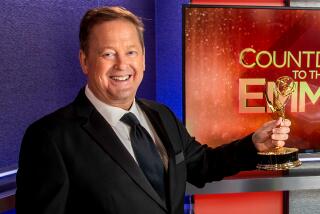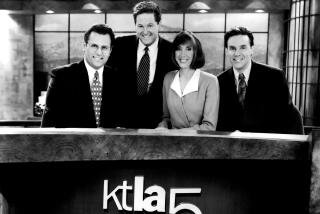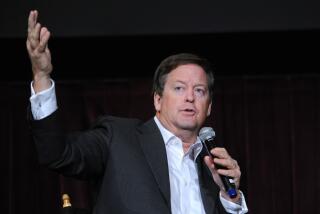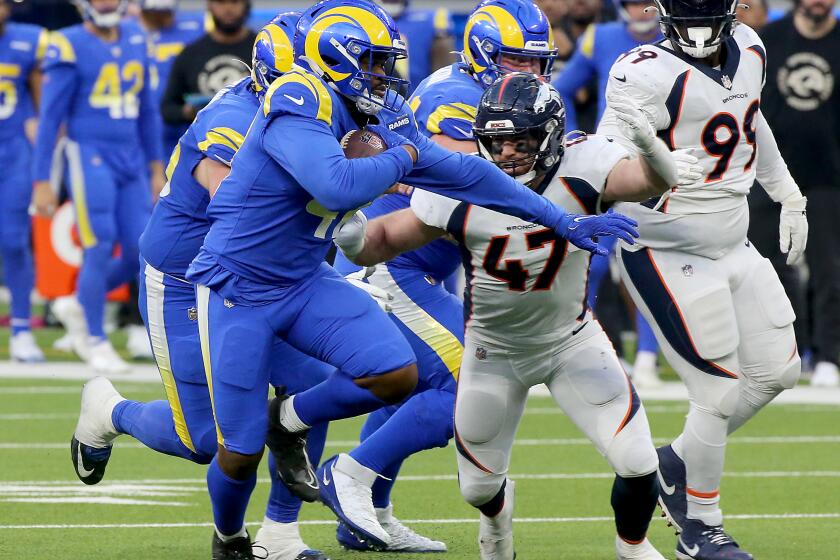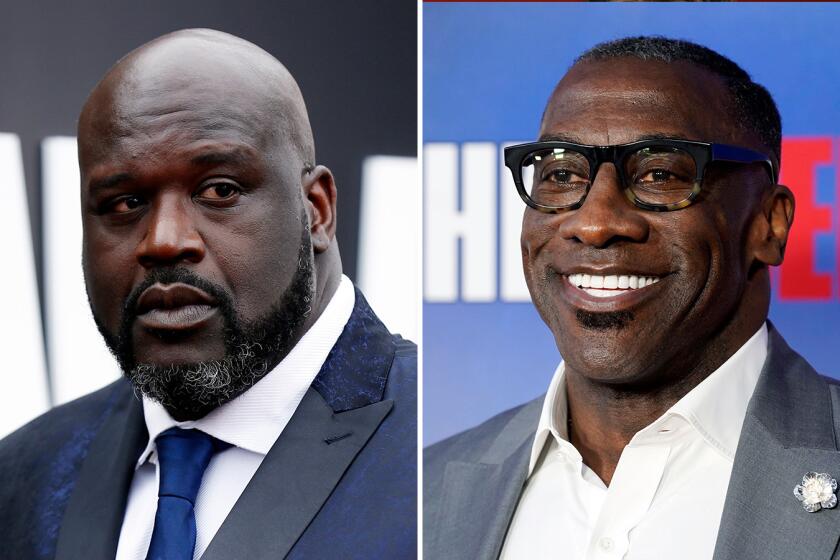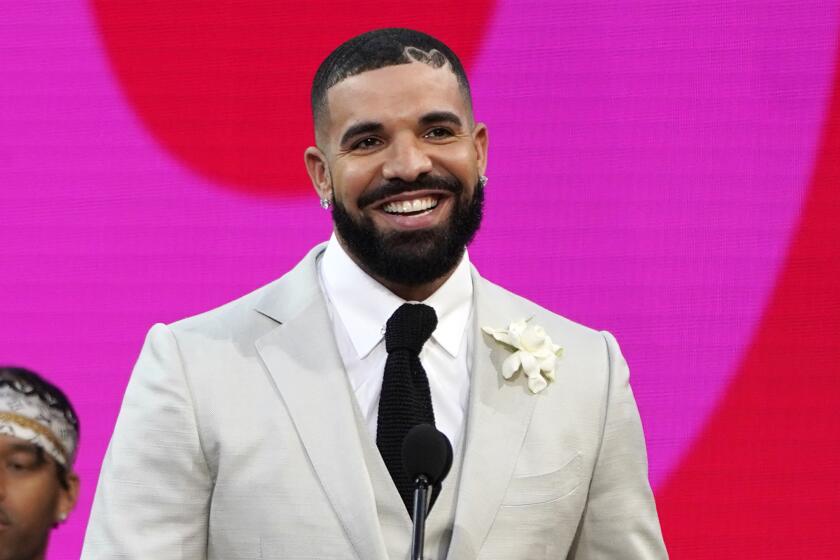CNN’s Choice of Woodruff as Anchor Gives News Junkie Her Day in the Sun
Squeezed into a sky box, scanning the arena, trying to absorb everything and miss nothing, CNN “Election 2000” co-anchor Judy Woodruff is like a sprinter waiting for the gun to sound--coiled intensity, total concentration, not a drop of sweat . . . yet.
In minutes, President Clinton will begin his Monday night address at the Democratic National Convention. The veteran news anchor, who covered her first political convention in 1972, shifts into competitive overdrive: “I’m wearing my fangs and my elbows are sharpened. But I’m also smiling.”
For this “political junkie,” being in the sky box, with a mike ready to go live--this is the moment. It’s what makes all the hours spent downing political stories like bad coffee, all the nights spent prepping for interviews that get canceled in the morning worth it. “For someone who loves to cover politics, this is the big Megillah,” says Woodruff. “I love being around all these people who eat, sleep and breathe politics. This is Broadway. I would die if I weren’t here.”
Even for Woodruff, a seasoned pro who has reported on every national political convention for three decades, Clinton’s address will be a history-making moment, one that she believes will define this convention.
In Woodruff’s playbook, Clinton’s speech officially kicks off the political season’s “third quarter.” The unpredictability of the moment keeps the adrenaline pumping on Day 1 of this otherwise overly scripted event.
“This is the political swan song for the man who has dominated politics the last eight years,” she says. “He’s a man who is used to having center stage, and now he is ceding that to someone else.”
A Resume to Die For
Since the 1970s, the 53-year-old Woodruff has been a national journalistic mainstay, working at NBC’s “The Today Show” as its chief Washington correspondent, and reporting as NBC News’ White House correspondent from 1977 to 1982, covering the Carter and Reagan administrations. Woodruff went on to anchor PBS’ weekly documentary series, “Frontline with Judy Woodruff,” then spent a decade as the chief Washington correspondent for PBS’ “The MacNeil/Lehrer NewsHour.”
Her move to CNN, orchestrated by CNN president Tom Johnson, was a good match. It was 1993 and the cable news service was looking for ways to take its news coverage to a more credible level. Woodruff, with her PBS credentials, made an attractive addition to CNN’s core anchor team.
She said at the time that the way in which the cable news service was approaching the business of news and information intrigued her enough that “I ultimately decided I wanted to be a part of it.”
For Woodruff, CNN represented a serious option in a pool of shrinking broadcast opportunities as Dan Rather, Tom Brokaw and Peter Jennings had settled into their network anchor chairs.
Then too, while Woodruff admits to loving Washington politics--the kind of internal network politics that was turning contemporaries such as Diane Sawyer and Barbara Walters into major stars was not her strong suit. Those who have worked with her through the years say Woodruff simply doesn’t have the ego to navigate those waters.
Among her Washington colleagues, Woodruff is known as a careful, conscientious news broadcaster. When the task is to push and probe and tell a story, Woodruff is at home. “You don’t get to anchor a convention until you’ve really earned it,” says Richard Kaplan, president of CNN U.S. “Judy has more than earned it. She’s like John Elway before the last Super Bowl.”
That helps when, as it did Friday, real life intrudes on CNN’s plans.
A circuit blows just as the afternoon edition of “Inside Politics” is ready to go live from CNN’s Staples Center studio--one of nine skyboxes the cable network has for the duration of the convention.
Woodruff, co-anchor Bernard Shaw and senior analyst Jeff Greenfield sit helpless at the anchor desk while CNN anchor Jim Moret, operating from the network’s L.A. headquarters, starts the show by remote. As a monitor shows a shot of Staples Center, Woodruff quietly quips, “There we are, but we aren’t there.”
Ten minutes into the show, Woodruff and Shaw are now the images filling the screen, making mellow apologies, the glitch smoothly dispensed with.
“With our format being live all the time, we have to be ready for anything, like a poised panther,” Shaw said. “And of all the people I’ve anchored with, she’s the pro’s pro.”
But it’s not all business in L.A. In Washington, where she’s based, she and her husband, Al Hunt, the executive Washington editor for the Wall Street Journal, are one of that city’s power media couples. The stacks of party invitations pile up. It’s no different here. Those rare moments over the weekend when she wasn’t in the control booth, or on air, or prepping for the next show, she stayed holed up in her downtown hotel room sorting out last-minute details. Finally, on Sunday night, she slipped out for a dinner for the vice president’s daughter Karenna Gore Schiff.
Monday dawns early for Woodruff. She starts by arming herself with the essentials for a tough day: two chocolate candy bars “for energy”; her glasses “in case I drop anything on the floor”; and her blanket, because “Bernie [Shaw] and I always have this friendly argument” about the temperature in the booth.
By 7:30 a.m., Woodruff is in a car heading to the Ritz-Carlton hotel in Pasadena to moderate a panel on the U.S. political system, sponsored by the National Democratic Institute, a bipartisan organization promoting politics and democracy.
By noon, Woodruff is back at CNN’s command center and she’s on the air by 1 p.m. interviewing former President Carter.
Nothing She Does Is Scripted
Either Woodruff has no preshow rituals or she does not want to reveal them. A colleague offers that she’s a huge fan of chocolate chip cookies: Keep those around and “Judy is happy.”
Whether it’s the cookies or the competition that does it, keeping Judy happy is critical. “Being one of the anchors, she must have the potential to lead into 50 or 60 pieces. Nothing is scripted, everything is ad lib,” Kaplan said. “She carries a third of the load of anchoring [along with Shaw and Greenfield]. But Judy is just one of those Gibraltars.”
At 6 p.m., Woodruff sits alone, in the dark, munching a sandwich and chips at the anchor desk. It is the last moment of solitude she will have tonight.
Clinton is due on stage around 7:15 p.m. As conventions typically do, this one is running late. Waiting, Woodruff is anything but passive. She shifts in her chair--watching the podium, monitoring the images flashing on the big screens, then turning to the churning red, white and blue sea of hats and banners below.
Suddenly she is still. Clinton is in the arena. He takes the stage, and as the cheering dies down, the unflappable cool-under-pressure Woodruff reaches for her note pad as Clinton begins: “Thank you very much. Thank you. Oh, thank you. . . .”
More to Read
The biggest entertainment stories
Get our big stories about Hollywood, film, television, music, arts, culture and more right in your inbox as soon as they publish.
You may occasionally receive promotional content from the Los Angeles Times.
